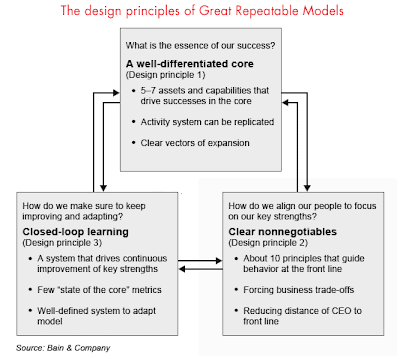What is the secret of enduring business success? The answer, according to Bain & Company’s Chris Zook and James Allen, is to develop repeatable business models. This is described in Bain’s website on Repeatability and highlighted in a recently published book by the authors.
In this podcast on HBR Ideacast, Chris shares that businesses which keep changing courses and introduce unnecessary complexity in their systems are actually killing themselves. To cope with a fast changing, highly complex and unpredictable world, businesses shouldn’t introduce increasingly convoluted systems that add layers of bureaucratic layers that slow down work processes unnecessarily.
Instead, they should zoom in on two things: focus and simplicity.
Citing examples such as Ikea, Vanguard Financial Group and Nike (versus Reebok), the authors claim that the most enduring businesses are not proponents of radical reinvention. Rather they stick to a tried and tested formula that is easy to execute from the top right down to the frontline which gives the businesses nimbleness and adaptability.
Three principles guide the development of a “Repeatable” business strategy and these are highlighted in the diagram below (courtesy of Bain & Company):

Courtesy of Bain & Company
1) A Well-Differentiated Core
To succeed in the marketplace, company’s must have a distinct point of difference from their competitors which offers them significant competitive advantage. The most successful companies are crystal where this may lie: Walmart in “everyday low prices” and obsessive inventory management, Ikea in flat-pack DIY furniture design, Apple in “insanely great” products.
Business models that are razor sharp in their differentiation do not hover from fad after fad. Rather, they identify where their core is and adapt it to suit changing market or competitive situations. Being authentic and sticking to one’s corporate DNA also helps.
2) Clear Nonnegotiables
A successful company needs to have a way of ingraining its core values to each and every staff – from the CEO right down to the frontliners. These ground rules for action should guide behaviours and norms that are explicit about what can or cannot be done, and why they are developed that way. It is also important for the distance between executive leaders and ground staff to be shortened so that information can move either way as quickly as possible with minimal encumbrances.
In an example cited by Bain, Vanguard’s activities and decisions are guided by highly consistent ‘Simple Truths’ such as the statement “Low expense ratios drive high returns.” Another more well-known example is the luxury hotel chain Ritz Carlton’s Gold Standards which includes its famous motto “We are Ladies and Gentlemen Serving Ladies and Gentlemen”.
3) Closed-Loop Learning
Having a repeatable business model doesn’t mean sticking to the same product or service year in year out. Instead, the authors feel that these can continually adapt to changing circumstances. I guess the key idea here is to create robust systems that can merge constant feedback from customers and frontline employees to adapt, innovate and improve products and services on the go. Such a quick feedback mechanism also allows businesses to quickly identify potential threats and nip them in the bud.
As an example, the authors cite Liechtenstein-based toolmaker Hilti (they do have very unique case studies!). The company fielded a direct salesforce of more than 12,000 representatives who help to provide feedback on what customers desire as they speak to them each day, and these field insights help the company to understand its customers better.
Do you agree that the most successful companies have a “repeatable” business model?


Excellent post sharing for business strategies…
Business Startup
I heard this podcast as well and loved it. I especially loved how Vanguard’s core values made it stay away from pushing bad financial products. Its contrarian behaviour actually saved it from the Crisis.
Geri,
In an age where strategies are a dime a dozen and information wants to be free, many are tempted to embrace “idea surfing”. The danger is that they start discarding the old just because it sounds “traditional” and embrace fashionable new trends without considering the suitability of such strategies to their enterprise.
This article is really cool. I have bookmarked it. Do you allow guest post on your site ?
I can write high quality articles for you.
Let me know.